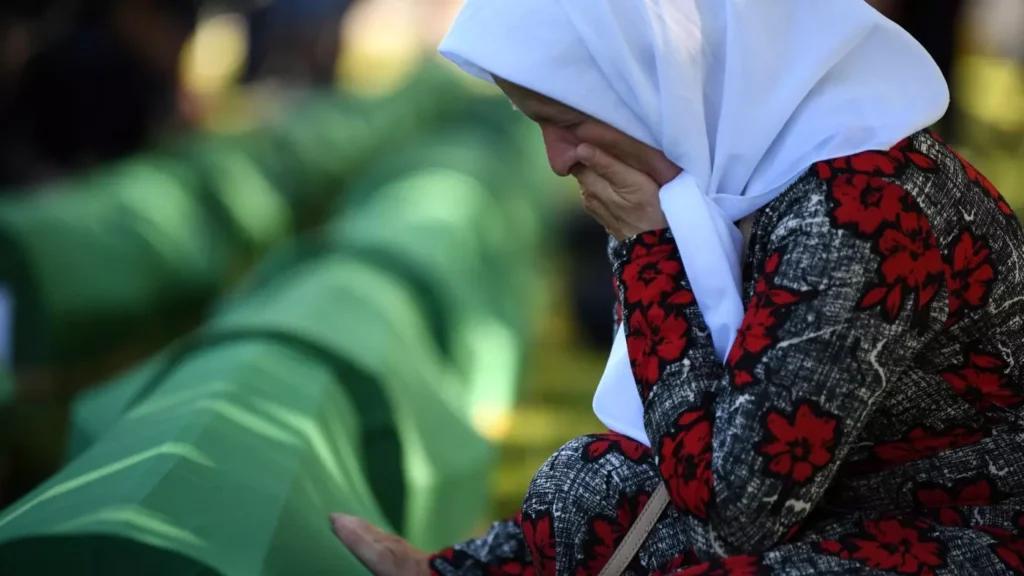Genocide on Gaza: Did We Learn Nothing from the Srebrenica Genocide?
BALKANS AND EASTERN EUROPE, 15 Jul 2024
Nadina Ronc | Middle East Eye - TRANSCEND Media Service
This tragic legacy must serve as a solemn call to action, shaping a more compassionate world – not one that stands by as Israel annihilates Palestine.
11 Jul 2024 – As the sun sets over the Srebrenica Memorial Center, a seemingly tranquil resting place conceals a horrific history. Here lie the remains of Bosnian Muslims brutally murdered in July 1995 by Serbian soldiers under the command of the now-convicted war criminal General Ratko Mladic.Standing amid a sea of graves, I am enveloped in a profound silence. These graves hold the bodies of men and boys who were separated from their female relatives and executed.
In a grotesque effort to hide their crimes, the Serbs buried and then reburied the remains, scattering body parts across multiple mass graves. This is why some graves at the memorial centre hold only partial remains.
On 11 July, 14 more victims will be buried during the commemoration of the Srebrenica genocide. Eleven additional sets of remains have been identified, but the Missing Persons Institute of Bosnia and Herzegovina is awaiting family authorisation to bury them. Families often hope that more complete remains may be found before laying their loved ones to rest.
Visiting the Srebrenica memorial had a profound impact on me, underscoring the international community’s failure to uphold the promise of “never again”. The Holocaust was meant to serve as a stark reminder of the consequences of unchecked hatred, but history has seen repeated lapses.
On 11 July, survivors, families and global citizens will gather to honour the memories of the more than 8,000 Bosnian Muslims killed in Srebrenica. This commemoration is not just a solemn tribute to the victims, but a powerful reminder of the horrors of ethnic violence and the enduring need for vigilance against hatred and intolerance.
The war in Bosnia and Herzegovina was considered the worst in Europe since World War II, and Srebrenica is a stain on humanity that allowed genocide to occur again on European soil. It took years for international courts to bring the perpetrators to justice, with the global response widely criticised as inadequate and delayed.
‘Never again’?
For almost four years, genocide unfolded in Bosnia while the international community watched, not lifting a finger to end the violence. The commitment to “never again”, a vow to prevent future genocides, often seems aspirational. I question whether it is truly universal, or selectively applied.
As we pause to remember the Srebrenica genocide, another tragedy unfolds more than 2,000 kilometres away in Gaza, rooted in the historic occupation of Palestine. This fact is often overlooked as western leaders focus on the events of 7 October, when Hamas launched attacks inside Israel.
The West often assigns blame to the Palestinian people, neglecting the historical context of suffering that began with the British empire’s Balfour Declaration. The disproportionate brutality enacted by Israel in Gaza is not classified as genocide by western leaderships, which remain silent and complicit.
Under Prime Minister Benjamin Netanyahu, Israeli forces have targeted civilians, including hospital patients, labelling them as Hamas rather than recognising them as civilians and human beings.
The Srebrenica genocide stands as a harrowing reminder of the capacity for human cruelty, and the catastrophic consequences of hatred and intolerance.
Defending against South Africa’s genocide charges at the International Court of Justice, Israeli legal adviser Tal Becker argued that the term “genocide” should not be misused, noting that it was coined to describe the Holocaust’s atrocities. Applying this term to Israel’s actions, he said, would undermine its significance and the intention behind its creation, which was to prevent horrors like the Holocaust.
It is not surprising that Israeli officials hold controversial views on genocides outside the Holocaust. The Israeli ambassador to Serbia, Yahel Vilan, has said that labelling the mass killing in Srebrenica as a genocide “diminishes the importance of that term”.
This perspective reflects a tendency to reserve the term “genocide” exclusively for the Holocaust, potentially undermining the recognition of other atrocities, even though the Srebrenica massacre was ruled as a genocide by the International Criminal Tribunal for the Former Yugoslavia in 2004, and the International Court of Justice in 2007 found Serbia guilty of failing to prevent genocide.
Western hypocrisy
The international community’s commitment to “never again” is often viewed as being selectively applied, rather than universally upheld. This assertion is supported by examining various mass atrocities in recent decades and the responses – or lack thereof – from the global community.
For instance, despite warnings and evidence of escalating violence, the international community failed to intervene in time to prevent the massacre of around 800,000 Tutsis and moderate Hutus during the Rwanda genocide. This highlighted a significant lapse in the “never again” commitment, which continues today in Gaza, where Israel is massacring Palestinians and destroying their cultural heritage, to almost make it look as if they never existed on their own land.
National interests and geopolitical alliances frequently shape the extent and nature of international intervention. Countries are more inclined to intervene or remain silent based on their strategic interests. In the case of Bosnia, a Muslim-majority country, the plight of its citizens during the 1990s was disregarded. The priority appeared to be the division of Bosnia, rather than ending the bloodshed. A similar situation is now unfolding in Gaza.
While the Holocaust established a framework for addressing genocide, subsequent atrocities have revealed significant gaps in the application of the “never again” principle. The disparity in responses highlights how geopolitical, economic and political factors often overshadow the universal moral imperative to prevent and punish genocide.
The West’s credibility has faltered in Gaza. Never again will any western country have the moral authority to call out human rights abuses in any state, failed or otherwise – because they have remained silent as brutality is broadcast live on our television screens. This hypocrisy undermines the very principles of justice and humanity that the West claims to uphold.
The Srebrenica genocide stands as a harrowing reminder of the capacity for human cruelty, and the catastrophic consequences of hatred and intolerance. As we reflect on the tragedy that unfolded in July 1995, it is crucial to honour the memories of the more than 8,000 Bosniak men and boys who lost their lives.
This dark chapter in history underscores the necessity of vigilance in safeguarding human rights and preventing such atrocities in the future. By committing to education, awareness and justice, we can strive to create a world where such horrors are never repeated. The legacy of the Srebrenica genocide must serve as a solemn call to action, shaping a more compassionate and just world – not one that watches as Gaza is annihilated.
____________________________________________
 Nadina Ronc is a journalist, author, and political analyst specialising in Russian foreign policy and energy security. Her research on Russia’s interference in the Western Balkans was funded by the Strategic Studies Institute of the US Army War College. She previously worked for CNBC and Fox Business Network and has written for the Journal of Peace and War Studies, Anadolu Agency, and Al Jazeera English, as well as commented for Al Jazeera Balkans and TRT World.
Nadina Ronc is a journalist, author, and political analyst specialising in Russian foreign policy and energy security. Her research on Russia’s interference in the Western Balkans was funded by the Strategic Studies Institute of the US Army War College. She previously worked for CNBC and Fox Business Network and has written for the Journal of Peace and War Studies, Anadolu Agency, and Al Jazeera English, as well as commented for Al Jazeera Balkans and TRT World.Tags: Balkans, Crimes against Humanity, Gaza, Genocide, Genocide Studies, History, Israel, Massacre, Palestine, Serbia, Srebrenica Genocide, War crimes
DISCLAIMER: The statements, views and opinions expressed in pieces republished here are solely those of the authors and do not necessarily represent those of TMS. In accordance with title 17 U.S.C. section 107, this material is distributed without profit to those who have expressed a prior interest in receiving the included information for research and educational purposes. TMS has no affiliation whatsoever with the originator of this article nor is TMS endorsed or sponsored by the originator. “GO TO ORIGINAL” links are provided as a convenience to our readers and allow for verification of authenticity. However, as originating pages are often updated by their originating host sites, the versions posted may not match the versions our readers view when clicking the “GO TO ORIGINAL” links. This site contains copyrighted material the use of which has not always been specifically authorized by the copyright owner. We are making such material available in our efforts to advance understanding of environmental, political, human rights, economic, democracy, scientific, and social justice issues, etc. We believe this constitutes a ‘fair use’ of any such copyrighted material as provided for in section 107 of the US Copyright Law. In accordance with Title 17 U.S.C. Section 107, the material on this site is distributed without profit to those who have expressed a prior interest in receiving the included information for research and educational purposes. For more information go to: http://www.law.cornell.edu/uscode/17/107.shtml. If you wish to use copyrighted material from this site for purposes of your own that go beyond ‘fair use’, you must obtain permission from the copyright owner.
Join the discussion!
We welcome debate and dissent, but personal — ad hominem — attacks (on authors, other users or any individual), abuse and defamatory language will not be tolerated. Nor will we tolerate attempts to deliberately disrupt discussions. We aim to maintain an inviting space to focus on intelligent interactions and debates.
Read more
Click here to go to the current weekly digest or pick another article:
BALKANS AND EASTERN EUROPE:
